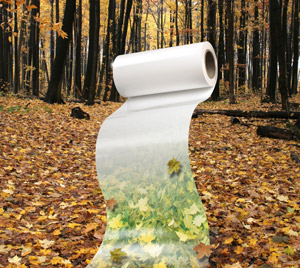CORBION PURAC
Collaboration with Innovia Films to develop PLA biofilms / Early tests show improved resistance to higher temperatures
 Innovia Films and Corbion Purac have overcome the problems of limited heat resistance from PLA films (Photo: Corbion Purac) |
UK-based biofilm manufacturer Innovia Films (Wigton; www.innoviafilms.com) and lactic acid and lactides specialist Corbion Purac (Gorinchem / The Netherlands; www.purac.com) are to cooperate on the development of PLA film that is both transparent and resistant to higher temperatures. High heat PLA was brought to market following research by Corbion Purac and Innovia identified an opportunity for the companies to work together to develop films in the material.
Early product development has shown that the films exhibit considerably less shrinkage at high temperatures compared to existing PLA films, the companies said. They offer properties much closer to oil-based PET and overcome the problems of limited heat resistance encountered in many biopolymers.
Potential applications for the film include food and non-food packaging and a range of industrial uses. In food packaging, such as pouches for juice or soup, the material will be able to withstand temperatures required for sterilisation. Non-food applications could include release liners for pressure sensitive products, window films, and protective films for smartphone screens. Many of these applications require thermal stability during processing or use.
Corbion Purac’s lactide monomers are sourced from GMO-free, renewable feedstocks such as sugarcane, and form the basis for high performance PLA bioplastics. The resulting homopolymers have already proven to withstand boiling water and now have performance characteristics to compete with oil-based alternatives, the company said.
Early product development has shown that the films exhibit considerably less shrinkage at high temperatures compared to existing PLA films, the companies said. They offer properties much closer to oil-based PET and overcome the problems of limited heat resistance encountered in many biopolymers.
Potential applications for the film include food and non-food packaging and a range of industrial uses. In food packaging, such as pouches for juice or soup, the material will be able to withstand temperatures required for sterilisation. Non-food applications could include release liners for pressure sensitive products, window films, and protective films for smartphone screens. Many of these applications require thermal stability during processing or use.
Corbion Purac’s lactide monomers are sourced from GMO-free, renewable feedstocks such as sugarcane, and form the basis for high performance PLA bioplastics. The resulting homopolymers have already proven to withstand boiling water and now have performance characteristics to compete with oil-based alternatives, the company said.
11.10.2013 Plasteurope.com [226539-0]
Published on 11.10.2013

 German version of this article...
German version of this article...